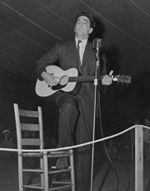How to Pronounce Alan Lomax
#50
Most Popular
Boost
Jan 31, 1915 Austin, Texas, United States Died on 19 Jul 2002 (aged 87)
American music historian, field collector, producer and filmmaker
AquariusAlan Lomax, Date of Birth, Place of Birth, Family, Facts, Age, Net Worth, Biography and More in FamedBorn.com

American music historian, field collector, producer and filmmaker
Aquarius